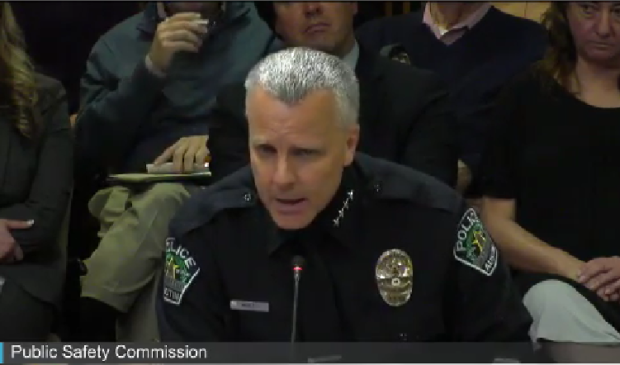APD Chief Manley addresses sexual assault audit
Tuesday, February 5, 2019 by
Jessi Devenyns At the beginning of 2019, Austin Police Department Chief Brian Manley called for a third-party audit of the department’s sexual assault cases. State auditors subsequently found that detectives had wrongly “exceptionally cleared” nearly a third of rape cases over a three-month period in 2017.
Responding to these findings, Chief Manley called for an outside review of the methods the department uses to investigate sexual assault. Adding more muscle to the investigation, last week City Council ordered an independent review of police handling of sexual assault cases.
In an effort to explain the discrepancies, Chief Manley appeared at the Feb. 4 meeting of the Public Safety Commission. Of the 95 cases that were audited from 2017, the Texas Department of Public Safety flagged 30 cases, and Manley told the commission that the police department was in agreement with 28 of those.
The two cases that APD did not find to be in error – that is, they had not been wrongly cleared – were due to different interpretations of what is called the “hierarchy rule.” The police chief explained to the Austin Monitor that this rule essentially boils down to a question of whether multiple incidences at the same location are considered one crime or multiple crimes. According to him, it depends on the length of time between the calls; in the two cases in question, he said that APD and UCR (the national Uniform Crime Reporting Statistics program) were not in agreement. Determining whether a case is separate or part of another can affect how cases are logged and classified.
Nevertheless, for the lion’s share of the cases questioned in the audit, Manley said, “we agree with the majority of their findings.”
One of the department’s biggest takeaways, according to Manley, was the necessity of minutely understanding the differences between the Texas penal code and UCR. One major variation, he told the commission, was what constitutes statutory rape versus rape, since the age ranges are different under Texas law than at a national level. The department also acknowledged that it was inappropriately exceptionally clearing cases in which the victims had recanted their testimony.
As a result of these insights, Chief Manley told the commission that APD investigators underwent a two-hour training in order to better understand the UCR code. “We also strengthened our policies around the use of exceptional clearance code,” he said. Now, any case that is slated for exceptional clearance must be cleared by a supervisor – the department has recently hired a third – and the officer on the case must fill out a prescribed template to make sure the clearance meets all the requirements for that classification.
Additionally, APD is looking at cases more holistically. “We start by believing (the victim), and that carries through the investigation,” explained Chief Manley. So even if a victim of sexual assault recants, the department will consider other evidence to determine why the person is recanting, for example, if it’s voluntary or forced. Then APD will determine whether or not to pursue the case.
Just prior to the commission meeting, Manley told the Monitor that the department had released its responses to the Department of Public Safety and that the information is now publicly available. Going forward, he said that the goal is for the department to make changes to ensure appropriate future use of UCR codes in order to avoid any administrative collisions that could cause a repeat of the audit results.
Video capture courtesy of ATXN.
The Austin Monitor’s work is made possible by donations from the community. Though our reporting covers donors from time to time, we are careful to keep business and editorial efforts separate while maintaining transparency. A complete list of donors is available here, and our code of ethics is explained here.
You're a community leader
And we’re honored you look to us for serious, in-depth news. You know a strong community needs local and dedicated watchdog reporting. We’re here for you and that won’t change. Now will you take the powerful next step and support our nonprofit news organization?




